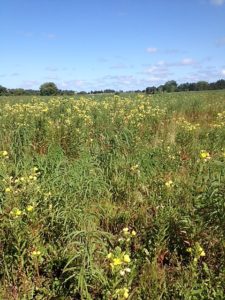Autumn is probably the busiest time in our preserve. One might think that with the growing season behind us, things would settle down. In truth, September through November brings hundreds of children visiting for field trips, and hundreds of acres of habitat needing attention in preparation for next year’s growing season. We are teachers and wildlife farmers. We plant crops of trees and wildflowers, and raise livestock of songbirds, bugs, and frogs and deer mice. We are happy to do what we do, and to share it with others.

Primrose blooming
Like farmers, we are dependent on the soil and weather. We try to match what we plant with appropriate places on the land, and then we pray for a little help from the weather to help things along. Its been a good year, and inspired by that good fortune, we are ambitiously planning for next year. In our forests, we’ve been pleased with the growth of the trees and shrubs planted the last several years. At this stage, we tend to them mostly to protect them from deer. Now, we’re preparing to order more than 2,000 trees and shrubs to be planted next year in areas susceptible to the dreaded emerald ash borer. This winter and spring, we’ll be removing invasive shrubs to make room for the plantings, which is made possible by a grant from the US Forest Service- new partners in our efforts to best manage our special place in the world. We are very grateful for the help.
Along the East and West Twin Rivers, with the help of the Wisconsin DNR, we will be sowing seeds of native wetland plants- sedges, rushes, and wildflowers, in areas where invasive Phragmites grass was removed. Like other habitats, wetlands thrive on a diversity of plants, so the more we can enhance that diversity with native species, the more wildlife, including waterfowl and fisheries, will benefit.
In several large fields we are tending to thousands of milkweed plants for the butterflies, and sowing the seeds of many other native wildflowers that they and other pollinators will benefit from. Other fields large and small are being prepared for planting next year. In the last couple of weeks we’ve also planted 1,300 potted wildflowers around our headquarters, in our butterfly garden, and along Mariner’s Trail, with the help of many high school students and volunteers.
Fall is an excellent time for such work. It is the time when many plants shed their seeds which naturally fall to the soil where freezing and thawing buries them over the winter. They need a period of cold in order to mature and set their biological alarm clocks for germination in the spring. The cool weather also reinvigorates our own physiology, making this a much more pleasant and effective time to get work done.
There are so many opportunities to make things better in this world. I suppose its a matter of comparison- certainly at one time our area was covered with native plants and abundant wildlife. Then that was altered – the “cutover” of Wisconsin is a great example where forests were nearly removed one section at a time. Thankfully, everything wasn’t cut, and nature has a capacity to rebound – aided by us.
I saw an old photograph of my neighborhood a few days ago- the landscape was stark and barren, nearly treeless, bisected by dirt roads and dotted with a few houses. Now there are more houses, but there are also significantly more trees and shrubs than there were 100 years ago. A lot of the shrubs are non-native invasives, but over time those can be removed and replaced with better ones. The same goes for Woodland Dunes- there is actually more forest within the bounds of the preserve than there was in 1938, and there is more than we can do to improve it.
Everyone, even if they only own a flower pot, can be a wildlife farmer. But you have to be comfortable with doing the work of sowing while the wild things do the reaping- which is just fine with us.
photo- a field at Woodland Dunes planted with wildflowers, evening primrose and tall coneflowers
